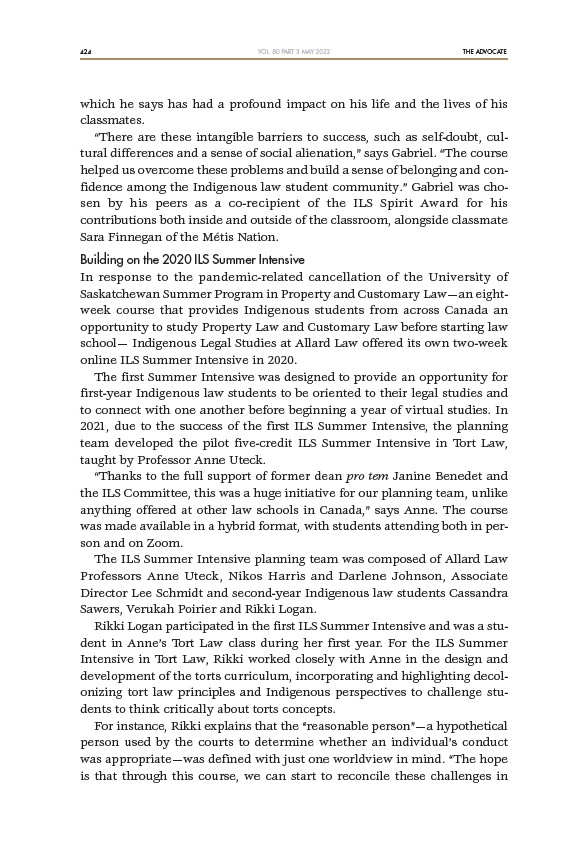
424 THE ADVOCATE
VOL. 80 PART 3 MAY 2022
which he says has had a profound impact on his life and the lives of his
classmates.
“There are these intangible barriers to success, such as self-doubt, cultural
differences and a sense of social alienation,” says Gabriel. “The course
helped us overcome these problems and build a sense of belonging and confidence
among the Indigenous law student community.” Gabriel was chosen
by his peers as a co-recipient of the ILS Spirit Award for his
contributions both inside and outside of the classroom, alongside classmate
Sara Finnegan of the Métis Nation.
Building on the 2020 ILS Summer Intensive
In response to the pandemic-related cancellation of the University of
Saskatchewan Summer Program in Property and Customary Law—an eightweek
course that provides Indigenous students from across Canada an
opportunity to study Property Law and Customary Law before starting law
school— Indigenous Legal Studies at Allard Law offered its own two-week
online ILS Summer Intensive in 2020.
The first Summer Intensive was designed to provide an opportunity for
first-year Indigenous law students to be oriented to their legal studies and
to connect with one another before beginning a year of virtual studies. In
2021, due to the success of the first ILS Summer Intensive, the planning
team developed the pilot five-credit ILS Summer Intensive in Tort Law,
taught by Professor Anne Uteck.
“Thanks to the full support of former dean pro tem Janine Benedet and
the ILS Committee, this was a huge initiative for our planning team, unlike
anything offered at other law schools in Canada,” says Anne. The course
was made available in a hybrid format, with students attending both in person
and on Zoom.
The ILS Summer Intensive planning team was composed of Allard Law
Professors Anne Uteck, Nikos Harris and Darlene Johnson, Associate
Director Lee Schmidt and second-year Indigenous law students Cassandra
Sawers, Verukah Poirier and Rikki Logan.
Rikki Logan participated in the first ILS Summer Intensive and was a student
in Anne’s Tort Law class during her first year. For the ILS Summer
Intensive in Tort Law, Rikki worked closely with Anne in the design and
development of the torts curriculum, incorporating and highlighting decolonizing
tort law principles and Indigenous perspectives to challenge students
to think critically about torts concepts.
For instance, Rikki explains that the “reasonable person”—a hypothetical
person used by the courts to determine whether an individual’s conduct
was appropriate—was defined with just one worldview in mind. “The hope
is that through this course, we can start to reconcile these challenges in